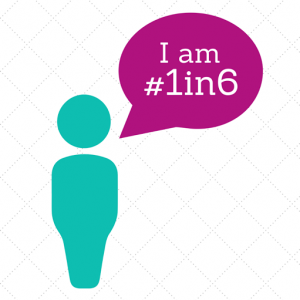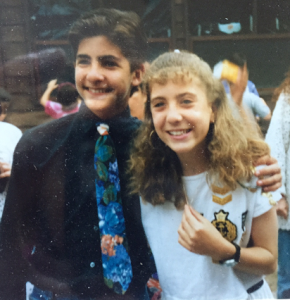 When the doctor suggests my husband do a semen analysis test, we laugh. We have been trying to get pregnant for some months now, but not long enough that we should be concerned. The doctor proposes Stephen do a test “just to be sure,” at a routine physical, and something seems comical about the deliberateness of this commonplace intimacy-that he will have to come home from work to pleasure himself at exactly 2:30 p.m. and then run the sample over to the lab for pickup by 3:00 p.m. Stephen recounts to me the small group of thirty-something men lining up outside the laboratory at 2:55 p.m., looking down, shuffling their feet with cups in hand waiting to turn over their deposits. We laugh at this too.
When the doctor suggests my husband do a semen analysis test, we laugh. We have been trying to get pregnant for some months now, but not long enough that we should be concerned. The doctor proposes Stephen do a test “just to be sure,” at a routine physical, and something seems comical about the deliberateness of this commonplace intimacy-that he will have to come home from work to pleasure himself at exactly 2:30 p.m. and then run the sample over to the lab for pickup by 3:00 p.m. Stephen recounts to me the small group of thirty-something men lining up outside the laboratory at 2:55 p.m., looking down, shuffling their feet with cups in hand waiting to turn over their deposits. We laugh at this too.
It is less funny the second time and then heartbreaking the third, when he is forced to do the test again and then again, the first, second and eventually the third revealing troubling numbers about our ability to conceive. The doctors give us a zero percent chance of getting pregnant on our own. If we are to have a biological child together at all, it will only be with costly and invasive intervention à la IVF and ICSI. We are referred to a fertility clinic where I undergo a battery of tests and discover that I have a low ovarian reserve, thus further complicating an already complicated case.
“Doctors don’t know everything,” my mother-in-law says, trying to keep our spirits up, “Just keep trying.” But how babies are conceived is no great medical mystery anymore: it takes a viable sperm to fertilize a healthy egg. Our bodies just might not be capable of this. This is a reality we need to be prepared for. As we make our way through the IVF process from cycle monitoring to egg retrieval to embryo transfer, it is difficult to remain hopeful yet practical about our odds. I don’t know how to focus my energy positively while protecting myself from an uncertain outcome.
I remember learning about infertility in the parochial school where I grew up, but the notion of wanting a child and not being able to have one seemed so very illogical to me. The teacher would recount how the Old Testament’s Sarah and Hannah struggled to have babies and I would wonder: how could that be? Everyone I knew was a child of parents. I was one of three. My older brothers are identical twins, a phenomenon happening only 3 times out of 1000. Don’t you see? Having a baby is so easy.
Except when it’s not.
My husband and I love each other so much-how could we have difficulty making a baby together? Stephen, with his gentleness, his own brand of down-to-earth sweetness, would make the most wonderful father in the world. Isn’t that enough? Why isn’t love enough?
 My husband and I at 12 years old. A year after we met.
My husband and I at 12 years old. A year after we met.
When Stephen and I first started trying to conceive, I imagined the excitement of telling him I was pregnant. He would come home from work and I would say “I’m pregnant!” before he even made it through the door. Overjoyed with the news, he would scoop me up in his arms and spin me around, both of us with tears in our eyes, and then he would quickly put me down, unreasonably worried about squeezing the baby growing inside me. We won’t have an intimate moment of joy like this. We will find out if we are to be parents in a doctor’s office. Such a moment is so small, so negligible, really, in the grand scheme of raising a life, that it seems silly to have trouble relinquishing it. I know we will be lucky to be parents at all, by whatever means, but it is nevertheless difficult to let go of the stories we imagine. It feels all the more frivilous to mourn these small details when our first round of IVF is unsuccessful.
IVF is emotionally, physically and financially brutalizing. I am having difficulty gathering my strength in preparation for round two. It’s difficult finding ways to distract myself from what’s to come. I read. I go for walks. I go to yoga.
“Is anyone pregnant?” the teacher asks, before instructing us to lie on our bellies.
I am not pregnant. I can lie on my belly. The woman in front of me can’t and I watch her throughout the class. We look the same; we have all the same parts, except for the baby growing in her womb. I wonder what she’s feeling deep inside her that I’m not, what stirrings are born by her movements. What does a growing baby feel like?
I am aching to soothe, to nurse, to cuddle, to love, to mother an infant. I buy flowers, individually, one at a time, and arrange them in a vase, trying to grow something, to cultivate life in our home. I buy new cookie-cutters for cookies I will again bake alone, because, as I tell my husband, our lives have not stopped and we are going to go about them the same way we would if we had a child – the one I picture standing beside me on a step-stool, mashing messy flower shapes into the dough. (“They’re perfect,” I imagine telling them. “What a good baker you are!”) I buy multicolored sprinkles: pinks and yellows and greens. I buy a bone for the dog and pet his head. I tell him he’s such a good boy. I scratch the cat behind her ears, just where she likes it, and tell her she’s a good girl too. I feed them, measuring amounts into their bowls, and when they eat side-by-side in the kitchen the house feels fuller, busier.
I will be okay. Whatever happens we will be okay. Our marriage will be okay. Because I treasure time with my husband. Because life goes on. Because our house is full of flowers, and sugar cookies, and animals, and love.
For more information on infertility in Canada, please visit the Infertility Awareness Association of Canada at www.iaac.ca.

![Am I Doing Everything Right to Become a Mother This month for fertilty matters, I wonder if I’ve done everything right to become a mother or if I drank too much coffee. You can check out my post here: […]](http://sadinthecity.com/wp-content/uploads/2015/07/IMG_05621-100x100.jpg)
![Writing for Fertility Matters – Smile Though You’re Infertile I am honoured to be contributing to Fertility Matters, a national organization that empowers Canadians to help reach their reproductive health goals by providing support, awareness, information and education; and […]](http://sadinthecity.com/wp-content/uploads/2016/06/StephenWendyDiego-100x100.jpg)

![Letting Go of Biological Motherhood I take my dog, Diego, for a walk over my lunch break hoping some fresh air will do me good. I’m in my new uniform: torn Joe Fresh sweatpants shoved […]](http://sadinthecity.com/wp-content/uploads/2016/03/fertilifucked2-100x100.png)
![I’m Expecting….A Web Series! I am so excited to share with you that I’m expecting…. a web series! Here is the trailer for How To Buy A Baby: https://www.youtube.com/watch?v=sLqSlmok9KA My team and I are […]](http://sadinthecity.com/wp-content/uploads/2016/03/prego-announcement-100x100.jpg)


![I am a Grown-Up! Even if my Nieces Don’t Think So… I begin to suspect my nieces, 12 and 9, don’t quite see me as a grown-up when I get a text from one while she is playing at the park […]](http://sadinthecity.com/wp-content/uploads/2015/10/aunt-big-deal-100x100.jpg)
![The Dialogue Project I am honoured to have contributed a piece to the Dialogue Project, a social mission dedicated to raising funds and awareness about mental illness. You can check out my post […]](http://sadinthecity.com/wp-content/uploads/2015/10/dialougeproject-100x100.png)


Hugs to you – thank you for sharing 🙂 I feel the same way about my husband… I just want to hurry up and make him the Best Dad in the World already… It’s been nearly 3 years, and it gets a little harder all the time. But I try to remember things can change on a dime and then we can finally move on to the next stage. In the meantime…. Cats! We have two 🙂
Hugs to you too, Juvarya! I hope this has a happy ending for you. In the meantime, cats are the best! I’m completely obsessed with mine. She and her dog brother truly make us feel like a family. Wishing you all the very best.
Wendy, this so beautifully written. You’ve perfectly captured what so many couples go through in their quest to have a child. In one posting, you’ve been able to make us both laugh and cry; you’ve helped us experience just a sliver of the crazy and cruel roller coaster ride you must endure in your journey to conceive. It can’t be easy to write about such things. A huge thank you to you and Stephen for opening up to us in this way.
Thank you so much for taking the time to read Mush and for all your kind words!
I am a male who loves reading your blogs and I find your writing so well done.
My wife and I had struggled to conceive our baby for over two years. We went through 2 miscarriages, IUIs, IVFs, a shit load of FETs and finally our miracle baby arrived.
I have four pieces of advice that got us through this difficult time.
1. Don’t give up! This is a shitty process but g-d willing it will be all be worth it!
2. Get a second opinion for another clinic. Maybe one doctor knows something another doctor doesn’t. I highly recommend this.
3. Rely on the support of your husband, friends and family. Don’t keep them in isolation (which it looks like you are not).
4. Take a break. Before the 2nd round of IVF we went on a fantastic vacation (even though we couldn’t afford it). This gave my wife a great break for her mind and her body.
I wish you nothing but the best for you and your husband.
Mr. X. congratulations on your miracle baby. Thank you so much for all your wonderful advice which I will definitely heed. I really needed to hear someone tell me not to give up. Thank you so much for that. I’m so sorry you had to go through this too but am so happy your story had a happy ending. All the best to you, your wife and baby!